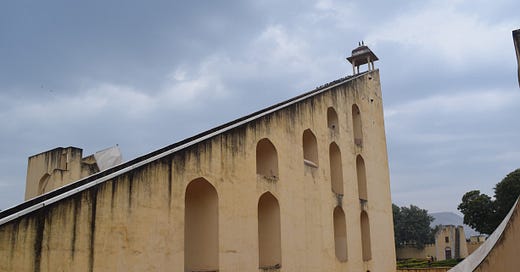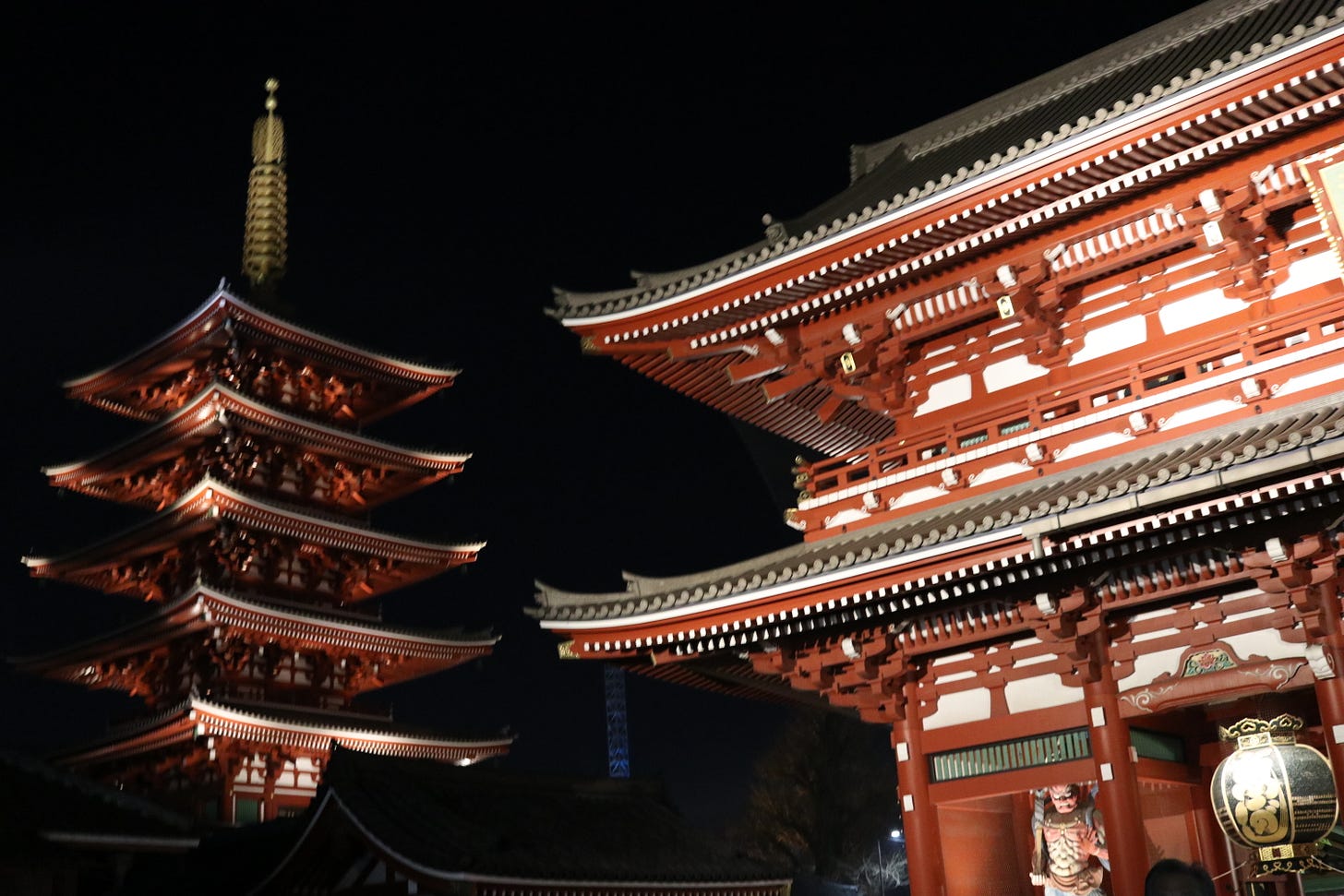I’m en route to the Jaipur Literature Festival, and I apologize if the writing quality on this post falls below average — I’m exhausted from travel and likely coming down with a cold, so I’m writing this through a caffeine-fueled haze. But we did it, we got the post done this week, guys! 🫠🫥💀
Though it’s not well-known outside of India, the festival is meant to be amazing. Past speakers have included Nobel, Pulitzer, and Booker Prize winners, and friends who’ve attended say they love it. I’m excited — enough to get sick traveling for, even.
So this week — as I’m about to attend a large, high-quality cultural event that’s relatively unknown outside its own particular culture — feels like a good time to talk about just this idea: how culture shows up and how it disappears, and how technology both aids and obstructs this process. Especially, I’m interested in looking at how technology developed by one particular culture can overpower that of others, and lead to their diminishment, or even gradual extinction.
In 1933, Jun'ichirō Tanizaki wrote “In Praise of Shadows” (PDF version), a hefty but delightful essay in which he discusses the rapid changes in technology and culture taking place in Japan at the time — changes like the introduction of the modern indoor toilet, electric lighting, and typewriter. Tanizaki bemoans the ways these technologies diminished Japanese culture, especially aesthetics of architecture and interior design, food, and clothing. He repeatedly points out how many of these technologies were driven into Japan by America and Europe, or “The West,” often without consideration for Japanese aesthetic and cultural values.
I’m ashamed to say I knew little about Tanizaki until reading this, but he was shortlisted for the Nobel Prize in Literature in 1964. If anything, this underscores the value of events like Jaipur Literature Festival, which ideally help ensure we in the “West” aren’t exposed solely to artists and ideas coming from our own cultures, nor that we’re the only ones telling the world which artists and ideas to pay attention to.
As an aside, I learned about Tanizaki’s essay from Kyle Chayka’s new book Filterworld, which deals with many of these same ideas. I’ll touch on the book’s ideas here, but have just started reading and will discuss it at length sometime soon.
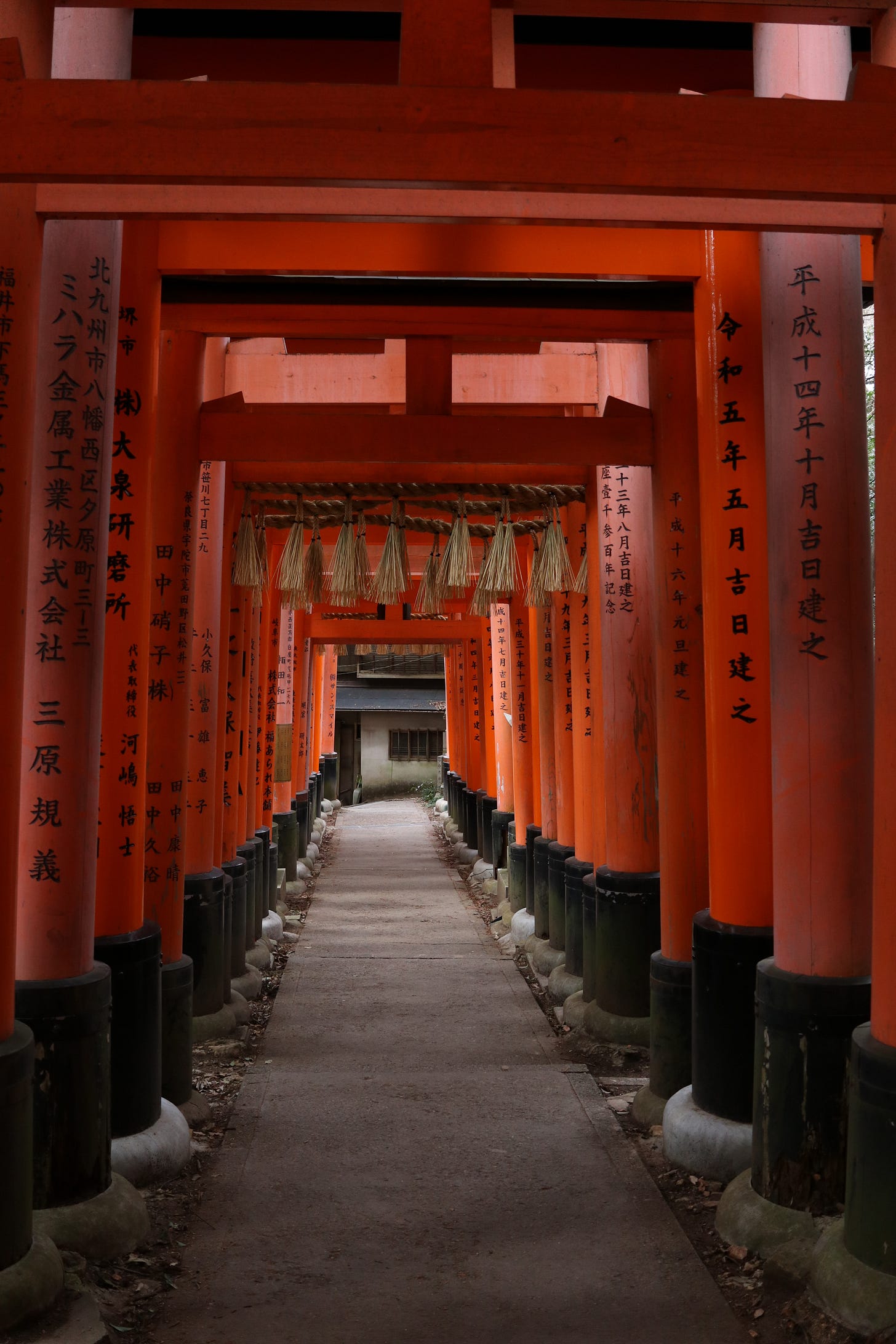
In Praise of Shadows
While Tanizaki praises aspects of modern technology, the essay at times reads as an elegiac for a Japanese past he saw disappearing before his eyes. And it’s hard not to agree with him that this sounds tragic — I just visited Japan for the first time, and absolutely loved it. When Tanizaki discusses the values underpinning the architecture and design of Kyoto’s temples, I feel both grateful that the last 100 years of technological change haven’t been as devastating as Tanizaki probably feared, and also wondering what Japan was like before western technology likely changed some of its features forever.
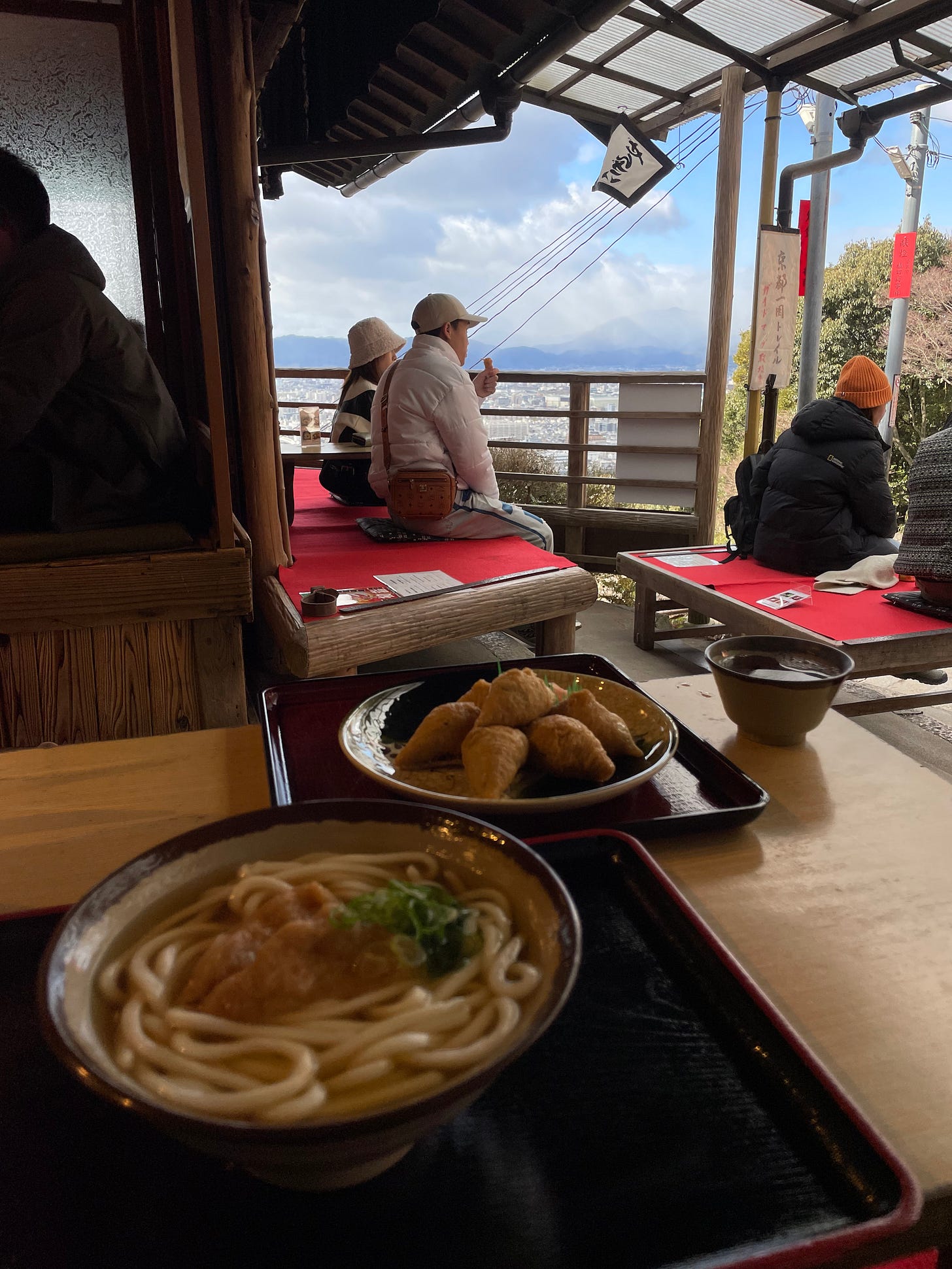
Consider Tanizaki’s description of the traditional Japanese bathroom, set apart from the main house. This is only a small portion of his description, long as it is.
Who wouldn’t want this kind of bathroom experience? Even if, as Tanizaki notes, “in winter there is always a danger that one might catch cold…. as the poet Saitō Ryoku has said, ‘elegance is frigid’”:
“I love to listen from such a toilet to the sound of softly falling rain, especially if it is a toilet of the Kantō region, with its long, narrow windows at floor level; there one can listen with such a sense of intimacy to the raindrops falling from the eaves and the trees, seeping into the earth as they wash over the base of a stone lantern and freshen the moss about the stepping stones. And the toilet is the perfect place to listen to the chirping of insects or the song of the birds, to view the moon, or to enjoy any of those poignant moments that mark the change of the seasons. Here, I suspect, is where haiku poets over the ages have come by a great many of their ideas. Indeed one could with some justice claim that of all the elements of Japanese architecture, the toilet is the most aesthetic. Our forebears, making poetry of everything in their lives, transformed what by rights should be the most unsanitary room in the house into a place of unsurpassed elegance.”

Tanizaki focuses much of the essay on differences he perceives between western aesthetic values, which he claims prize brightness and light, and those of Japan, which he says value darkness and shadow. None of this would matter much if the West hadn’t effectively “beaten” Japan in the game of global technology expansion during his time, exporting American and European technologies — laden with American and European cultural and aesthetic values — with it.
I’ll quote Tanizaki at length:
“....it is on occasions like this that I always think how different everything would be if we in the Orient had developed our own science. Suppose for instance that we had developed our own physics and chemistry: would not the techniques and industries based on them have taken a different form, would not our myriads of everyday gadgets, our medicines, the products of our industrial art—would they not have suited our national temper better than they do?….
“This could not but have had profound influence upon the conduct of our everyday lives, and even upon government, religion, art, and business….
“Something near Japanese paper—even under mass production, if you will—would have been most in demand. Foreign ink and pen would not be as popular as they are; the talk of discarding our system of writing for Roman letters would be less noisy; people would still feel an affection for the old system. But more than that: our thought and our literature might not be imitating the West as they are, but might have pushed forward into new regions quite on their own. An insignificant little piece of writing equipment, when one thinks of it, has had a vast, almost boundless, influence on our culture….
“If my complaints are taken for what they are, however, there can be no harm in considering how unlucky we have been, what losses we have suffered, in comparison with the Westerner. The Westerner has been able to move forward in ordered steps, while we have met superior civilization and have had to surrender to it, and we have had to leave a road we have followed for thousands of years.”
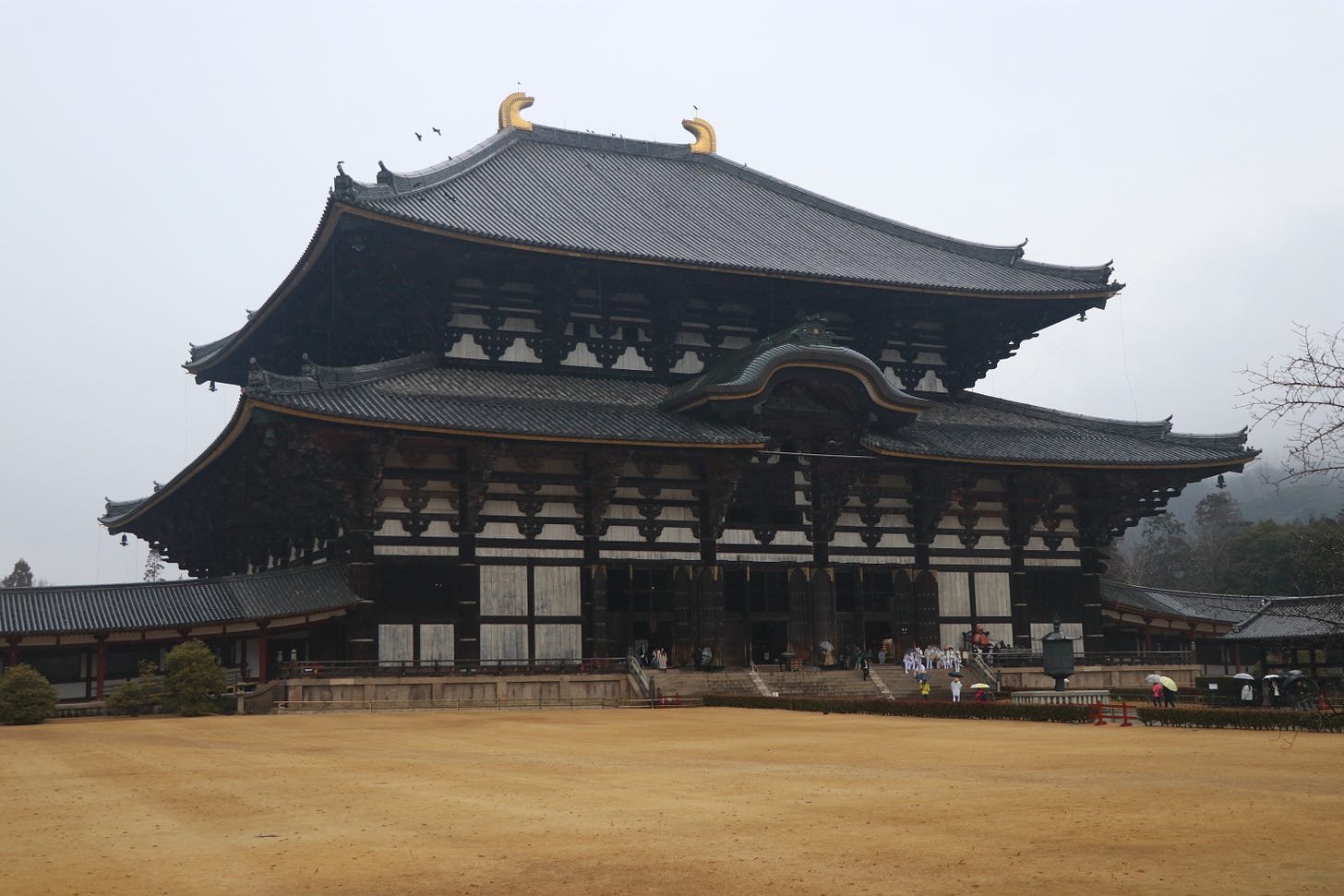
Like Bombing the Louvre
“When you lose a language, you lose a culture, intellectual wealth, a work of art. It’s like dropping a bomb on…. the Louvre.” — Ken Hale, linguist
Tanizaki’s essay bears direct relevance to how the internet impacts cultures around the globe today, just as America’s bright lights, tile bathrooms and “ugly Western stoves,” in his telling, impacted Japan a century earlier. While the internet is in theory a massive global network for the egalitarian sharing of ideas and values, in practice much of its activity is heavily driven by the West, and especially the United States.
Many of the most popular apps are designed in California, for instance, and the majority of websites host content in English, Spanish and other European languages. And as I’ve discussed before, a great deal of the internet backbone, including data centers and subsea cables, is built and managed by American companies.
As early as 2003, UNESCO was urging the international community to create cultural and linguistic diversity on the internet that’s as rich and voluminous as it is offline, “to ensure that all cultures can express themselves and have access to cyberspace in all languages, including indigenous ones.”
Indeed, according to Rest of World, “Bhanu Neupane, a program manager at UNESCO who works with language inequity, [said] we might be moving towards a world where only a handful of languages are meaningfully present online. ‘The world is converging…. after 15 years, there could be just five or 10 languages that are prominently spoken and used in business and online. So we’re very concerned about this.”
While a lack of linguistic diversity and representation online is itself a problem, the increasing prevalence of text-based AI in our digital lives only accelerates it. What new digital divides will form and expand as English-speaking populations gain access to the wealth of productivity enhancement that new chatbots and AIs promise, leaving the rest of the world’s speakers to a pre-AI world?
And more insidiously, AI only internalizes the biases of the data used to train it, such that a training set bereft of a diversity of languages and cultures will create an AI missing the same. Even if we momentarily ignore disparities in AI quality across languages when considering ordinary use, we should ask: what wisdom, jokes, and ways of seeing the world might be deprioritized, diminished, and perhaps even lost entirely in a world increasingly reliant upon it?
Even if we ignore disparities in AI quality across languages when considering ordinary use, we should ask: what wisdom, jokes, and ways of seeing the world might be deprioritized, diminished, and perhaps even lost entirely in a world increasingly reliant upon it?
I wanted to make this post fun and light after writing about Gaza the past month, but I think I failed.
So, a final “fun” question I’ve been wondering: is social media and the shape of our phones changing the way we take photographs?

Maybe it’s just me, but I feel I’ve recently heard a strong preference, especially among travelers, for photographs taken in portrait mode (“phone up”) rather than landscape (“phone sideways”). This must have changed as some point — most “real” cameras, after all, default to landscape mode. Historically, it took extra effort to rotate the camera to take a photograph the other way.
Is the shape of our social media feeds and phone screens changing the way we photograph the world? And if they are, is this not another example of technology shaping aesthetic culture?
I struggled to find any actual research or even ~hot takes~ on this, but would love to hear if you have thoughts. Surely I’m not the only one wondering this!
Song of the Week: Kyary Pamyu Pamyu — Live at Primavera Sound 2023. I happened across a performance by Japan’s Kyary Pamyu Pamyu a music festival in 2022 and was entranced. I want to see them again, even if I’d never listen to their music on its own. Between the costumes and the stage energy and seemingly the entire audience singing along, it was weird and amazing and very, very fun.

